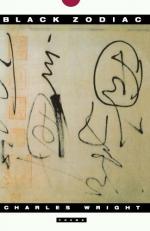|
This section contains 4,622 words (approx. 16 pages at 300 words per page) |

|
SOURCE: “An Interview with Charles Wright,” in Southern Review, Vol. 36, No. 2, Spring, 2000, pp. 442-52.
In the following interview, Wright discusses his education and formative influences, the thematic unity of his trilogy of collected works, and his poetic style, technique, and approach to serious philosophical subjects.
All my poems seem to be an ongoing argument with myself about the unlikelihood of salvation.
—Charles Wright, Halflife
Charles Wright's poetry is a strange alchemy, a fusion of the direct, understated lyrics of ancient Chinese poets like Tu Fu and Wang Wei, the lush language of nineteenth-century Jesuit Gerard Manley Hopkins, and the allusive, rhetorical movement—the “gists and piths”—of Ezra Pound's Cantos. The element common to each is a search for transcendence in the landscape of everyday. For Wright that landscape might be the shores of Italy, his native Tennessee, or his own backyard on Locust Avenue in Charlottesville. He...
|
This section contains 4,622 words (approx. 16 pages at 300 words per page) |

|


